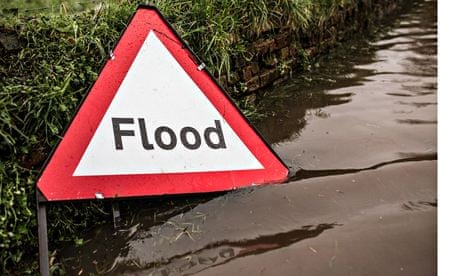In February the UK was hit by some of the worst storms in recent memory. Flood maps showed that huge areas of the Somerset Levels and the Thames valley were underwater, and whole communities were cut off for days at a time.
But it wasn't just our flood defences that were lacking – one of the toughest challenges during the floods was providing people in affected areas with up-to-date information. "I've been studying the graphs on the Environment Agency website trying to work out what they mean," Jeremy Langford told the Guardian in February as he tried to make up his mind whether to evacuate his home in the village of Moorland in favour of higher ground. "I'm sure somebody knows what the water is doing but if they do they aren't getting the message over to us."
The Environment Agency finally caved in to mounting pressure to release some of its flood data for free, and the UK's tech community cobbled together flood relief apps over a long weekend in mid February at Flood Hack, an impromptu hackathon hosted by Google's collaborative workspace in East London.
"The Flood Hack release of data has given us some hints of what can be done with open flood data," said data consultant Owen Boswarva, who sits on Defra's transparency board. "However what I see in them is how much they could be improved by the release of more relevant flood data sets."
The Environment Agency is facing a rising tide of pressure to open more of its flood data. The data sets it released in February included real-time river level data that updates every fifteen minutes. But the open licence on these data sets expires on 15 May, just three months after they were first issued, and they are just a fraction of the flood data that the Environment Agency holds.
"Complex problems demand massive amounts of data to solve," said Conor Riffle, director of data product innovation at the Carbon Disclosure project, which has released climate change data on the world's 100 biggest cities. "We need to improve the free flow of climate change data so we can start to get a handle on protecting people and property from the coming impacts of a changing climate." These impacts include more extreme weather like the storms that caused the UK floods.
Open data campaigners are hoping for an announcement from the Environment Agency in the coming weeks about opening its core flood data. But waiting for governments to open their data troves is not the only way to get your hands on it. In Philadelphia, in the US state of Pennsylvania, a group of 'civic hackers' going under the name Code for Philly have decided to take the collection of climate data into their own hands.
Code for Philly plan to collect local air pollution and temperature data using sensors attached to city buses so that they can quantify the effect of planting new trees in the city, as part of their Open Climate Tracker project. Trees have a cooling effect in cities due to water evaporating from their leaves, as well as providing shade to streets and roofs which absorb heat, but this can be hard to measure accurately.
Crucially, Code for Philly plan to release all the Open Climate Tracker data online so that people can develop useful applications with it.
By connecting GPS location data with temperature and particle sensors they plan to build an interactive climate map of the city that can provide real-time updates. "You could have an app that tells you when to bring your kids inside if there's a high level of particulates in the air," said Joshua Meyer, lead developer on the project. "Or if you go for a run in the city, avoid this area because there's high pollution right now."
In a few weeks they will launch a Kickstarter campaign to fund prototypes that will be strapped to bicycles to test the sensors. They plan to use the information they collect in combination with Open Tree Maps, a project that maps the location of trees in the city, to work out what effect a tree has on its surroundings.
"We can actually show how the micro-climate changes over time," said Meyer. "If you say to someone your street gets warmer by this much every year, you can't refute that, it becomes personal."
Meyer says that by showing people that planting trees can save them money on their air conditioning bill, Open Climate Tracker can help people make better decisions, as well as sway people who doubt that climate change is even happening.
This is more difficult than it should be, given the data already available: in the UK, David Cameron had to backtrack after he said he suspected there was a link between the floods and climate change, despite the Met Office's lead scientist, Julia Slingo stating that "all the evidence suggests there is a link to climate change." And in the US, 41% of Tea Party Republicans think global warming is 'just not happening'.
"Often government departments have difficulty recognising the untapped potential in reuse of the data they produce," said Boswarva. But maybe the tides are changing. In March the White House launched its Climate Data Initiative, which aims to make climate data more accessible through a government website, climate.data.gov. Meyer believes open climate data is the key to making climate change clear, and showing people how it affects them: with the right information, people can make better decisions in respect to the environment, as well as form strategies to protect themselves against changing weather conditions in a warming world.
Jack Millner is a freelance science and technology journalist based in London
To get weekly news analysis, job alerts and event notifications direct to your inbox, sign up free for Media Network membership.
All Guardian Media Network content is editorially independent except for pieces labelled 'Advertisement feature'. Find out more here.
